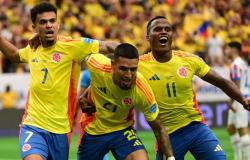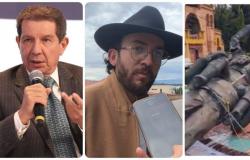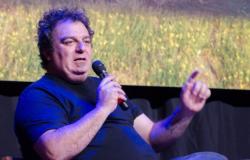Madrid/Miguel Díaz-Canel met for the most recent edition of his program Desde la Presidencia with a group of “young Americans interested in learning about the Cuban reality.” The audience, of about a hundred people, had already been briefed. They were the members of Let Cuba Live, a group attached to the pro-Castro organization The People’s Forum and co-directed by Manolo de los Santos, who moderated a meeting in which the island’s past and present were discussed, with the “intensified blockade” as a backdrop, of Palestine and, above all, of the example of democracy that is Cuba.
“There is a virtual Cuba, on social networks, and there is another real Cuba, which is the one you are seeing. And we have shortcomings, we have problems, we have limitations but there are no missing people here, there are no murders here. “This country is more democratic than the United States,” the Cuban leader said with conviction. The phrase was part of an extensive block dedicated to exposing his point of view on how capitalism has proven not to work if it does not apply social justice as, he argued, is done on the Island.
“They say we are not democratic because we have only one party, and the United States is democratic because it has two parties? One party, the Republicans, applied the 243 measures to tighten the blockade, and another party, the Democrats, maintained the blockade measures,” he summarized. “What is the story? Is democracy measured by the number of parties or is democracy really measured by how people in a society can make use of their rights?”
“They say we are not democratic because we have one party, and the United States is democratic because it has two parties?”
The president wanted to give examples of the inequality of rich countries without noticing the flaws in his speech. “When we look for food, we look for food for 11 million Cubans. It’s not about putting food in the windows and letting those who can buy it and the others dying of hunger,” he reflected, although on the Island that is already the constant reality, as a consequence of the absence of products in the rationed market, sales in freely convertible currency and skyrocketing inflation, among others.
Much of the meeting was, it could not be otherwise, crossed by the policy of “suffocation” that, according to the president, the United States applies to Cuba, an island that survives this thanks to its “creative resistance,” and that would reach levels of unimaginable development if it were allowed a deployment without “lockdown”. “Where would Cuba go if it didn’t have a blockade? There I believe is the answer to why they want to continue blocking us. They are afraid of the example, of what we are capable of doing, for everything we have managed to do in the midst of that circumstance,” he stated.
Manolo de los Santos started the evening by thanking Díaz-Canel for receiving the group, which, he said, has been trying for months, without success, for Joe Biden to receive them and only finds an armored White House, while in Cuba the doors are opened. arms. His first question revolved around the long history of the revolutionary struggle on the Island, which went back to the time of slavery, the War of Independence and, of course, Castroism.
Díaz-Canel regretted that Washington resorts to wars to provide an outlet for its million-dollar arms industry first and reconstruction later.
Palestine monopolized part of the scenery – both De los Santos from the beginning and the president, who received it from a guest, wore a kufiya on the shoulders – and the speech, although this sounded, at times, more like an excuse to attack the United States, which was accused of genocide on repeated occasions. Díaz-Canel regretted that Washington resorts to wars to provide an outlet for its million-dollar arms industry first and reconstruction later, at which time he also introduced Ukraine into the equation. “It is very normal that, in the face of an international crisis, the United States causes a focus outside its border where there is a war and where the United States can do its big business. “That’s what Ukraine is going through.” In addition, the Cuban president applauded the pro-Palestinian movement that emerged in some universities in the United States, which he compared to the activism against the Vietnam War in the 70s, and Europe.
After 10 minutes talking about Palestine, he compared the resolutions that call for a ceasefire in the Gaza Strip with those that annually reject the US embargo on Cuba.
Another of the great topics of the day was the difficult moment that the Island is experiencing, taken advantage of by the United States to convey the image that the Cuban Government is incompetent, he explained. “We are living in a difficult time, but when Fidel and Raúl led the country they also faced very complex situations and together with the people they overcame them,” said Díaz-Canel, who mentioned the lack of fuel, electricity and food – all of which feed off each other – as a source. of those problems. “We are not perfect nor do we want you to idealize us. We also make mistakes, we have insufficiencies – among them he spoke of “laziness” and “corruption” –. But there is an enormous vocation for perfection.”
Washington’s mechanism consists, he told the young people present as usual to the Cubans, of provoking “a social outbreak that ends the Revolution” through “economic asphyxiation” and “media intoxication.” Asked how Cuba combats this situation, Díaz-Canel was blunt: with more democracy. The president alleged that it is discussed ad nauseam in the neighborhoods and assemblies and that, for this reason, the many laws that are being approved have countless versions, because the people are listened to. He omitted to mention that the limits of the discussion are precisely in one of the main constitutional precepts, which indicates that it is not possible to change the socialist system.
The challenges that, in the opinion of the president, remain to be faced, apart from the explicit mention of the problems with the exchange rate or the measures that must be taken without making them known – he argued, once again, that “the enemy” blocks the solutions. that Cuba finds if it reports on them – are in maintaining social programs and winning over youth, where the future lies.
“[Somos] A country that has been blocked for more than 60 years, defending socialism. Socialism fell in the 90s and this country remains that way. How can this country still continue to approve a socialist Constitution? “Doesn’t that have tremendous merit?” she asked rhetorically. No answers were needed in an event that opened with chants that claimed: “the socialist world is the world we want.”






